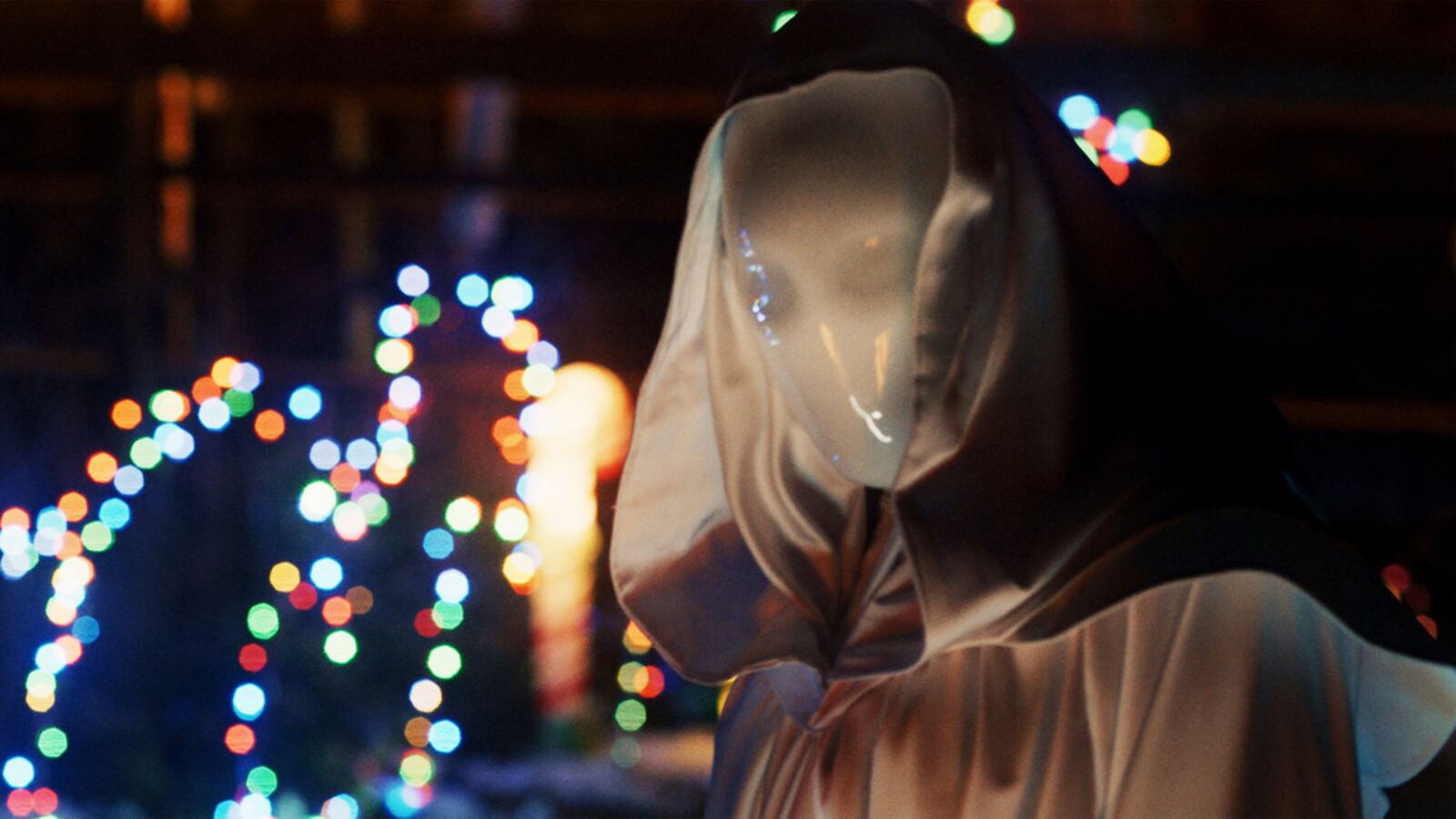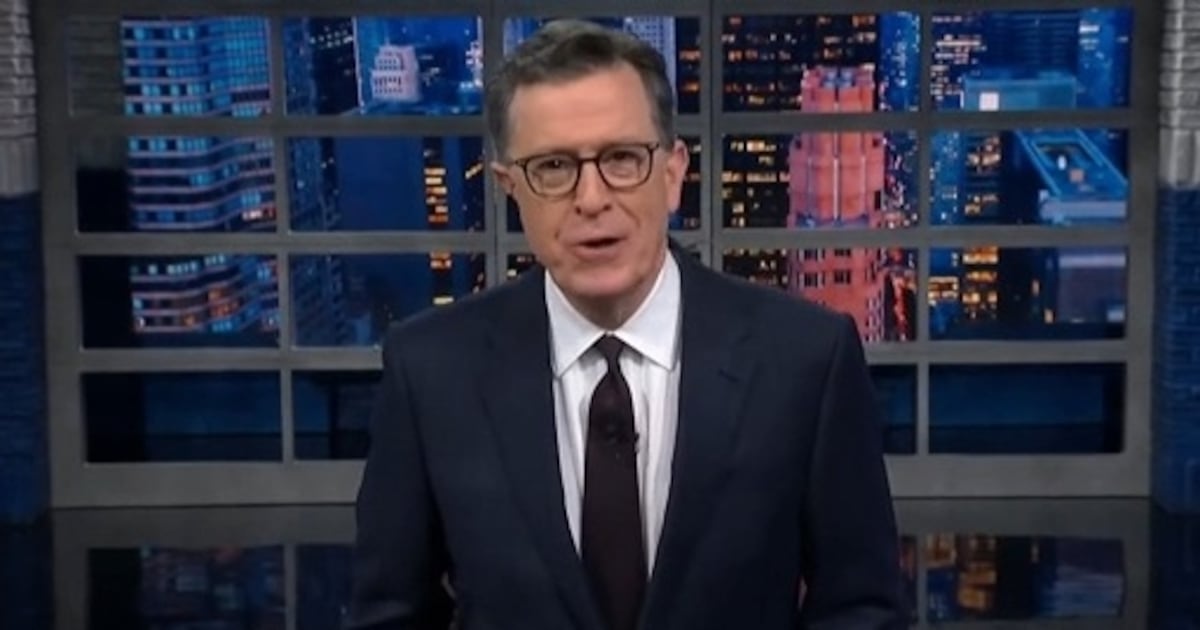The title of It’s a Wonderful Knife (in theaters Nov. 10) doubles as the film’s elevator pitch: It’s Frank Capra’s classic of Yuletide magnanimity, reimagined as a holly-bedecked horror flick. Easily enough said and sold, but actually following through on the snappy logline proves more convoluted than in the recent ready-made slasherfications of Groundhog Day (Happy Death Day), Freaky Friday (Freaky), and Back to the Future (Totally Killer).
A masked assassin stalks the snow-blanketed hamlet of Angel Falls, and when he strikes at a house party on Christmas Eve area teen Winnie (Jane Widdop) gets the drop on him with a pair of jumper cables and a car battery. As dictated by the code of Scooby-Doo, the culprit is the grabby developer (Justin Long) with the displeasing Joel Osteen dentures, and he’s dispatched in short order.
One year later, however, Winnie’s not feeling all that jolly. Her workaholic dad (Joel McHale) gifts her annoying brother (Aiden Howard) a car while she’s stuck with an insulting monogrammed scale. Then she catches her beau doing mistletoe-type things with another girl. While staring at the aurora borealis—at this time of year, in this part of the country?—she wishes she’d never been born, and finds herself in a still-terrorized town that makes Pottersville look like Pleasantville.

That’s about a half-hour of wind-up in an 87-minute movie, and neither scribe Michael Kennedy nor director Tyler MacIntyre (currently having an eventful month as a cowriter of Five Nights at Freddy’s) do much to make merry with the premise they’ve worked so hard to gift-wrap for us. Drably photographed, leadenly unfunny, and flimsily assembled, this seasonal trinket has a white-elephant disposability liable to send viewers rummaging for a receipt.
Following the tiresome, obligatory adjustment period during which Winnie wonders why nobody’s recognized her since right around the time she willed herself out of being, she gains her Clarence—a parallel explicitly stated with dialogue, for anyone stumped by the title’s seeming non sequitur—in social outcast Bernie (Jess McLeod). Via the freeze-dried bantering of YA lit, they go from unlikely partners to besties to could-it-be-something-more, one strand in a queer streak that also extends to Winnie’s with-it aunts and OnlyFans-trawling brother.
The spirit of updated inclusivity fits right in with the subversive revisionism inherent in spattering a Christian observance with arterial spray, though Kennedy and MacIntyre also hold fast to Capra’s warming wholesomeness. The preordained finale taps into the same catharsis of redemptive second chances linking Scrooge, The Grinch, and George Bailey. It’s just that in Winnie’s case, the true meaning of Christmas amounts to ditching your suck-ass boyfriend to hook up with the cute, misunderstood girl who can see the real you.
The contrast between rosy-cheeked sentimentality and violence sharpened to an icicle’s point could’ve been played for big laughs, or at least laughs bigger than Winnie’s repeated reaction of “Seriously?!” to shocking sights. (Anna and the Apocalypse had a better handle on this bit, going all in on chipper holiday dissonance with its upbeat, zombie-strewn musical numbers.) Like the latest It Toy cleared off the shelves, charm is in short supply for this film; there’s no texture or character to its cheapness, the rickety DIY gumption of low-budget genre filmmaking replaced by a stifling digital sterility starved for light and pops of color. Even a pair of scenes at unsupervised ragers lack any sort of festive charge, as if to illustrate the difference between a party and a bunch of people standing in a room while music plays. If all this is meant as a riff on the thinness and Kinkadean hideousness of mass-produced Hallmark originals, the self-awareness fell off the sled somewhere along the way to Grandmother’s house.
In search of a resolution to tie a ribbon on everything, MacIntyre and Kennedy get bogged down in metaphysical horse pucky that doesn’t really make sense—though, to be fair, neither does the ending of It’s a Wonderful Life. Capra waved away the logistics with high-proof pathos, and glossed over the fact that Bailey’s life had not materially improved through the uplifting powers of populist camaraderie. So long as we’ve got our health and our loved ones, we’ll muddle through somehow—the same chestnut cracked by our hero as she comes to appreciate the one cool girl in her town. Remember, Winnie: No man is a failure who has a crush that likes them back.

But a moral skirting the maudlin must be duly earned, otherwise it’ll feel as grafted-on as the romance used here to implant a heart in a film more taken with the structuring device than the soul of its main inspiration. Anyone can borrow a setup famed for extracting tears around this time of year, and deviously turn it on its head. Doubling back to actually pull it off takes a Christmas miracle.






